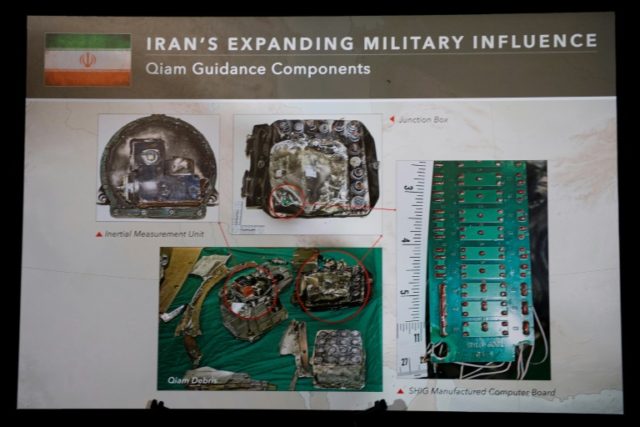Washington (AFP) – By threatening to withdraw from the Iran nuclear deal, the United States wants to halt Iran’s ballistic missile program and its growing influence in the Middle East.
European leaders will be under pressure from President Donald Trump, who will announce his decision on the future of the deal on Tuesday, to renegotiate a broader agreement addressing those points.
But Tehran is refusing to change a single comma of the deal it signed in July 2015, which lifted international sanctions in return for restrictions on its nuclear program.
– Sunset clause –
The deal curbs the Iranian nuclear program for a period of at least 10 years.
The number of centrifuges used for research and development is limited until 2025, uranium enrichment is limited until 2030, and inspections by nuclear experts will go on until 2040.
But Washington wants to extend these restrictions, arguing that current measures only kick the problem down the road.
And Israeli Prime Minister Benjamin Netanyahu insists that Tehran is secretly continuing to develop its military nuclear capabilities.
“It’s totally unrealistic to believe that Iran will accept perpetual limits on its sovereignty,” said the International Crisis Group (ICG) in a recent report on the issue, quoting an anonymous French official.
Dalia Dassa Kaye, a Middle East specialist at the Rand Corporation, said that while “Iran would be unlikely to agree to new sunset provisions,” it may yet “be convinced to engage in preliminary discussions if European powers present an attractive economic package as a counter to the United States.”
Tehran, facing a tough financial crisis, is still waiting to feel major economic benefits from the deal.
– Ballistic program –
Washington wants to tackle Iran’s ballistic missile program, which it deems harmful to security and stability in the Middle East.
The United Nations has warned Tehran against developing a missile that could carry a nuclear warhead. Israel, which is within range of Iran’s missiles, considers this an existential threat.
Iran, which sees itself surrounded by US military bases and the arsenals of its neighbors, says the ballistic missile program is purely defensive and will not be used for weapons of mass destruction.
It does not see its missiles as part of the nuclear deal and considers the issue to be non-negotiable.
“The Iranians view their ballistic missiles as a critical element for their national defense, so this may be one of the most difficult areas to push for limits,” said Kaye.
She said if the nuclear deal does not collapse, “missile discussions will need to focus on confidence building steps, like limiting missile ranges and testing.”
– Iranian influence –
Iranian influence in the region is at the heart of US concerns. Washington has reiterated that Iran’s “hegemonic” ambitions in the Middle East violate the spirit of the 2015 deal, and has denounced Tehran as a destabilizing force.
It has slammed Tehran’s “material and financial support” for “terrorism and extremism,” citing its backing of the Lebanese military and political organization Hezbollah.
In Syria, where Tehran supports President Bashar al-Assad, Iran says it is working to counter jihadists from the Islamic State group, while in Yemen, it backs Huthi rebels fighting one of its main regional rivals, Saudi Arabia.
UN experts have accused Iran of violating a Yemen arms embargo by allowing the Huthis to obtain drones and ballistic missiles to strike at Saudi Arabia.
Iran also backs Shiite militia forces in Iraq, and sees itself as the focus of “resistance” against Israel, the Middle East’s sole if unacknowledged possessor of nuclear arms.
The ICG says Iran has long pursued a policy of using proxies in weakened states to fight its battles against its foes — Hezbollah in Lebanon to fight Israel, militias in Iraq to fight US forces and the Huthis in Yemen against Saudi Arabia.
“As long as Iran pursues a policy in the region that, however defensive in origin it may be, others view as aggressive, tensions will persist and the possibility will rise of direct military confrontation,” the think-tank’s report said.
Noting how Iraqi nationalism pushed back against Iranian influence there, Kaye added: “Containing Iranian influence in the region will not be easy, but Iran also is not invincible.”
In Syria, Russia may be the best hope of limiting Iranian influence, at least in the south, to avoid an escalation in the conflict with Israel.
As for Yemen, Kaye said the best way of curbing Iranian influence remained a political settlement to the conflict and an end to Saudi intervention.

COMMENTS
Please let us know if you're having issues with commenting.